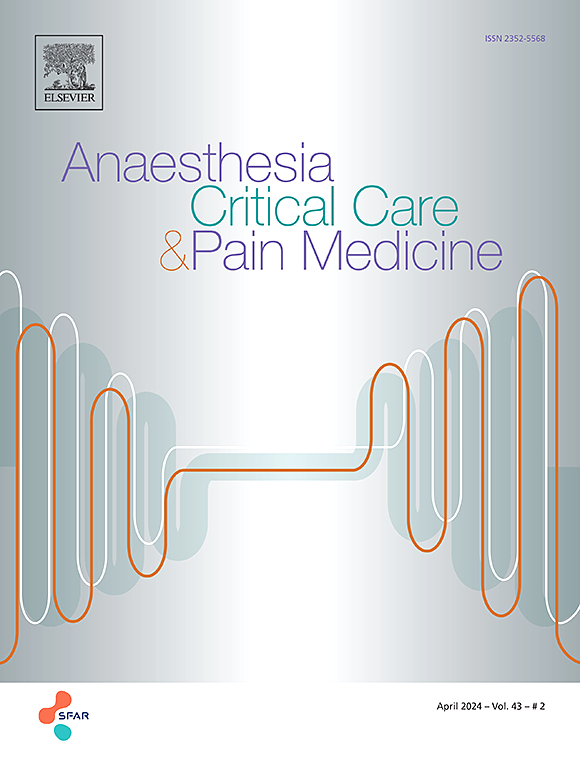Factors influencing the turnover of nurses in French intensive care unit—A multicenter interview survey
IF 3.7
3区 医学
Q1 ANESTHESIOLOGY
引用次数: 0
Abstract
Background
Nurse retention is a major concern in healthcare settings, especially among intensive care units (ICU), in which nurses are highly specialized. The objective was to describe the nurse courses after their entrance into the ICU, their motivation for leaving the ICU, and to identify the independent factors that influenced the nurse resignation from their units.
Methods
In 3 different centers, every ICU nurse working between 2013 and 2023 was telephonically contacted and was asked to describe their career and, when appropriate, the reasons that influenced their resignation from their units; they rated on a Likert scale of 14 factors that influenced their decision.
Results
Among the 405 nurses who worked in these ICUs between 2013 and 2023, 265 (65.0%) were included in the study, and 93 (35.1%) were still working in their unit. The median time of professional experience of the nurses in their ICU was 5.8 [5.0–7.0] years, and at 10 years, 26.3% [20.4–33.9] of the nurses remained in their unit, 23.8% [17.3–32.8] left the ICU but were still in-hospital nurses, and 22.4% [15.8–31.7] underwent specialization. A minority of nurses resigned and changed their careers (9.5% [5.3–17.0]). The main factors influencing the nurse’s resignation from their unit were belonging to Generation Y or Z (HR 1.89 [1.35;2.64]), experiencing symptoms of burnout (2.37 [1.63;3.46]), and pregnancy during the ICU (1.77 [1.41;2.23]). The COVID-19 period was inconsistently associated with nurse resignation depending on the center. The main motivations to leave the unit were organizational (variability of schedule, night shift), personal (willingness to change, personal event), and related to the ICU workload.
Conclusion
Nurse retention is an increasing concern, associated with the generational aspects and increased prevalence of burnout. Structural changes will have to be made to reduce the turnover.
影响法国重症监护室护士离职的因素——一项多中心访谈调查。
背景:护士保留是医疗保健机构的一个主要问题,特别是在重症监护病房(ICU),其中护士高度专业化。目的是描述护士进入ICU后的课程,他们离开ICU的动机,并确定影响护士从单位辞职的独立因素。方法:对2013年至2023年在3个不同中心工作的ICU护士进行电话联系,要求其描述其职业生涯,并在适当的情况下说明影响其离职的原因;他们对影响他们决定的14个因素进行李克特评分。结果:2013 - 2023年在icu工作的405名护士中,265名(65.0%)被纳入研究,93名(35.1%)仍在本单位工作。护士在ICU的专业经验中位数为5.8[5.0-7.0]年,10年时,仍留在单位的护士占26.3%[20.4-33.9],离开ICU但仍在院护士占23.8%[17.3-32.8],专科护士占22.4%[15.8-31.7]。少数护士辞职转行(9.5%[5.3-17.0])。影响护士离职的主要因素为Y、Z世代(HR 1.89[1.35;2.64])、倦怠症状(HR 2.37[1.63;3.46])、ICU期间怀孕(HR 1.77[1.41;2.23])。根据不同的中心,COVID-19期间与护士辞职的关系并不一致。离开单位的主要动机是组织(时间表的变化,夜班),个人(愿意改变,个人事件),以及与ICU工作量有关。结论:护士留任率日益受到关注,这与代际因素和职业倦怠的患病率增加有关。必须进行结构性改革以减少人员流动率。
本文章由计算机程序翻译,如有差异,请以英文原文为准。
求助全文
约1分钟内获得全文
求助全文
来源期刊

Anaesthesia Critical Care & Pain Medicine
ANESTHESIOLOGY-
CiteScore
6.70
自引率
5.50%
发文量
150
审稿时长
18 days
期刊介绍:
Anaesthesia, Critical Care & Pain Medicine (formerly Annales Françaises d''Anesthésie et de Réanimation) publishes in English the highest quality original material, both scientific and clinical, on all aspects of anaesthesia, critical care & pain medicine.
 求助内容:
求助内容: 应助结果提醒方式:
应助结果提醒方式:


